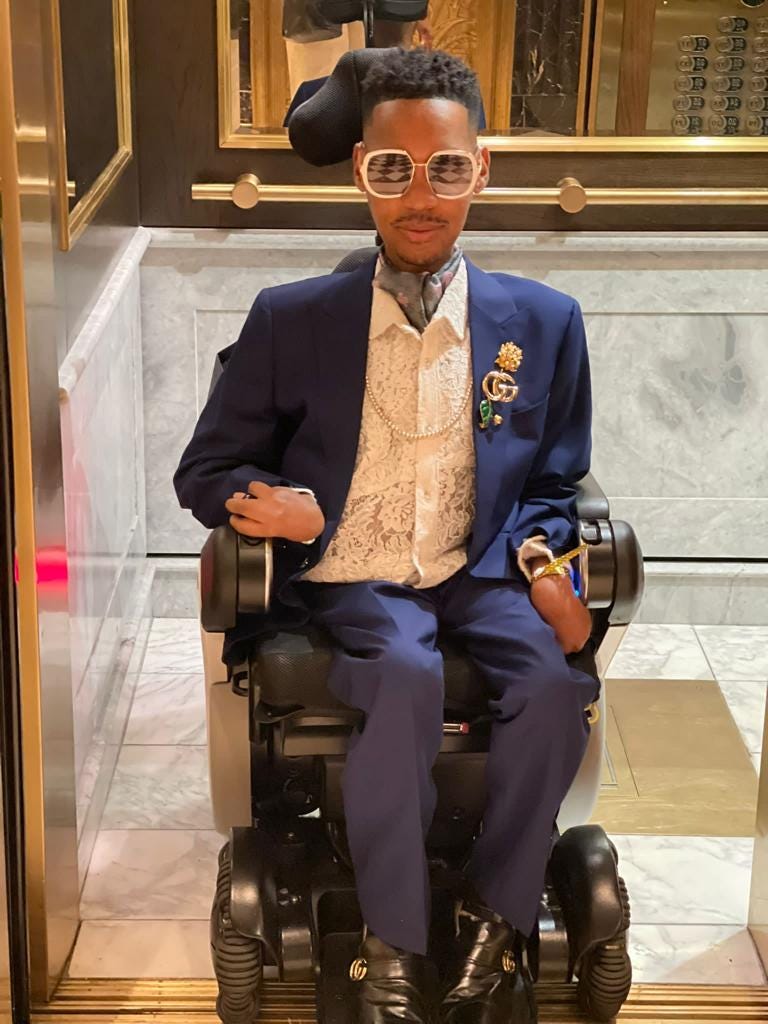To say disabled or not ... That is the question
Author and disability advocate Eddie Ndopu gives his take
Whenever I have the opportunity, I ask disability advocates how they feel about that word — DISability. I’ve written about my distaste for the word before. As a student of language and writing, it irks me that someone who has a different way of being in the world is othered simply because they have a unique way of getting around or because their brain works differently from most others. As such they are labeled dis-abled — meaning they are not able.
And, in so many cases, nothing could be further from the truth.
Case in point: I recently had the privilege of interviewing Eddie Ndopu — a disability advocate who wrote a memoir about his experience attending Oxford University as a disabled graduate student. Eddie was born with a degenerative spinal cord disease that has paralyzed most of his body — from the neck down, he can move only one finger. That interview was parlayed into a Q&A for the books section of the Christian Science Monitor which you can read here.
Despite his disability, or perhaps because of it, Eddie wrote “Sipping Dom Pérignon Through a Straw: Reimagining Success as a Disabled Achiever” which came out in August. It’s a brilliant title as it really encompasses Eddie’s attitude toward life. The older he gets, he told me, the more he tires of being resilient. Because, he says, he has “a profound yearning and appreciation for living.”
“I don't want to be resilient anymore,” he says. “I want to have joy. I want to be a little bit frivolous. I want to live my life. I love life, I like living. I don't think that has anything to do with my disability. I want to experience everything, to live as fully as I possibly can. And until I feel like I am filled up, I'm just going to keep wanting more.”
Societal norms, however, rob so many people of those opportunities simply because their differences aren’t considered when buildings are constructed, when roads and sidewalks are installed or when those with invisible disabilities are afraid to disclose their struggles for fear of feeling more alienated than they already do.
When I asked Eddie about the word disability, he said this: “I struggle with the word disability, with the language of disability and disabled. But I think there is something potentially revolutionary about claiming that and owning that. It can be useful for how we think about our feelings about bodies that don't work in particular ways. I need to question myself. What is wrong about being disabled? Is there something wrong? And why am I scared to use this word?
“I think that’s the limit of language,” he continues. “Language, not just in the context of disability, sometimes fails us. Language can quite adequately capture and count for everything so there are awkward phrasings that we need to deal with. But my foremothers and forefathers with disabilities have taught me that disability is not a dirty word. And so, I sit within that tradition as well.”
As to euphemisms for disability, Eddie scorns them.
“Differently abled, special abilities,” he says. “That feels borderline condescending to me. Euphemisms are trying to mask a feeling, trying to mask a discomfort. And the discomfort is not because there isn't another word for disability. The discomfort is with disability itself. So, I feel there's an agenda that's behind them that is profoundly rooted in ableism.”
I have more from Eddie that was not included here or in the Q&A — he’s so well-spoken. I will share his take on the medical model vs. the societal model of disability in a future issue. In the meantime, I’d be very interested to hear your take. What’s your biggest disability language gripe? Do you think, like Eddie, that disability is a word the community should embrace and, if so, why? Feel free to post in the comments below.
Thanks for reading. And remember we all have challenges so be kind to yourself and to others.






Thank you for this perspective, Jodi. Eddie Ndopu is incredibly inspiring and he gave me much to consider. I'm always trying to be conscious about my choice of words and their meaning. Language is always evolving as a reflection of our collective consciousness.
Thank you, Jodi, for this. Tough question, for sure. For me, in the end it comes to two things, I think. In this order:
1. we have got to respect (and care about) each other and,
2. we need to be able to communicate in the clearest and more effective way possible.
(Technically, I guess that was more than two things, but you get what I'm trying to say.).
I look forward to your essay on "medical model vs. the societal model of disability."
Hugs!
cjp